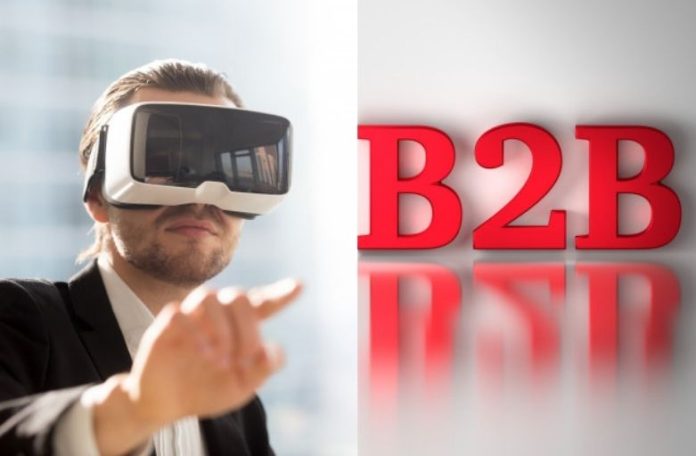Virtual Reality or VR is a term that has been making rounds for quite a while now. Before we dig further into how helpful VR in B2B is, let’s have a shallow insight into the term virtual reality.
Virtual reality (VR) is a simulated, multi-sensory experience augmented with the help of software and hardware components.
It provides an immersive environment different from the real world with the help of a head-mounted display.
Practically, the setup consists of an array of sensors embedded in the head-mount which tracks the movement of the user and changes the view accordingly.
This gives the user the impression that he/she is physically present in that virtual environment. This technology is famous among gamers as it gives them a rich, interactive gaming environment.
As per Markets and Markets, the VR market is expected to grow to USD 44.7 billion by 2024 from USD 7.9 billion in 2018 at a CAGR of 33.47%.
If you’re thinking how a technology that produces fabricated environments can help in business, then get your cup of coffee and read further.
With gaining popularity and the fact that it provides quite a few opportunities for marketers, businesses have started applying AR and VR technologies in marketing.
For now, VR‘s usefulness is somewhat limited to physical products but as the technology evolves and innovative solutions are developed, the service sector will also witness a heavy impact of virtual reality.
There are many companies out there that are using virtual reality in their manufacturing processes and service delivery.
Also, for products that are bespoke or don’t exist yet, how’ll the marketers give customers a glimpse of what the final product will look like? Again here, VR is the cool upgrade over unappealing 3d sketches or models.
Now that we have a rough idea of this technology’s resourceful for business, let’s take it to the next level and see what real benefits it’ll provide to businesses.
1. Product testing
2. Personalization Experience
3. Shortened sales cycles
4. Brand differentiator
5. Virtual Stores
Product testing might be the most obvious benefit of virtual reality. What more can a company ask for if they can see their product in real-time.
Not only it will help in making a better product but also save time. For example, construction companies can make use of AR for making better evaluations and testing different spacing solutions.
With customers demanding a tailored buying experience, personalized experience has become much more crucial.
And with this technology by your side, companies can show buyers the product in a virtual environment and hence problems can be addressed at an early stage and with more precision.
In a B2B scenario, the buying cycle is more convoluted and longer than in B2C. Buyers demand multiple stakeholders as far as B2B is concerned.
This problem can be solved via virtual reality wherein these stakeholders can be provided in an immersive and realistic environment instead of a boring product demo.
Due to this resourcefulness, the decision-making process can rapidly be sped up and help in closing the deals faster.
Tell me first, would you believe a salesperson who just exaggerates the brand or a salesperson who shows you the actual, practical advantages of products.
Well, I believe the answer is obvious. This resourcefulness differentiates your brand from the others, the competitors.
While all others will be bragging and showing off their brand you will be showing the actual product presentations.
One area where brands can take advantage of VR technology is by showcasing their products in virtual stores.
Agree with me when I say, seeing products in the real-world is far better than seeing them online for buying.
With the help of VR, an immersive environment can be simulated to imitate that “feel” of shopping in a brick and mortar store.
Provided through a great B2B Marketing asset, Cisco build an immersive product catalog, working with a 3D interactive sales and marketing company.
It basically is like a virtual trade show which gives users a clear concept of what products will look like, also enabling providing users the privilege to a “virtual walk around”.
Another terrific example of VR in B2B is, VERYX, a company manufacturing food processing systems. They created a very meticulous view of their digital food sorting platform, through VR.
It is one of the biggest barriers to the extensive adoption of VR technologies. It’s due to the lack of a good user experience design.
The reason behind this lack is that the 3D interface design is expensive and onerous and very few people are there with the necessary designing skills to surmount these issues.
Even though VR being already available to consumers through numerous devices like Sony PlayStation VR, HTC Vive, Oculus Rift, or Samsung Gear VR, it still hasn’t moved beyond that niche market.
For the mainstream entry, hardware needs to be readily available with these two important elements: convenience and control.
Smartphones are delivering excellent experiences at present, but will they prove convenient moving forward, is the question.
Well, I don’t think so. What we actually want is to hold them at eye height for an extended period of time, which a smartphone can’t deliver when I last checked.
While a hands-free AR will create a much more comfortable experience, and as Gartner predicts, AR HMDs will enter the market in significant volumes only after 2020.
AR is an emerging technology with the potential to disrupt B2B marketing. Relations with B2B clients can be improved. Also, helping them in presenting products in a way one didn’t have even imagined just a few years ago.
Recommended For You:
Applications and Benefits of Augmented Reality across various industries
Benefits of Augmented Reality based Google Maps for Business

